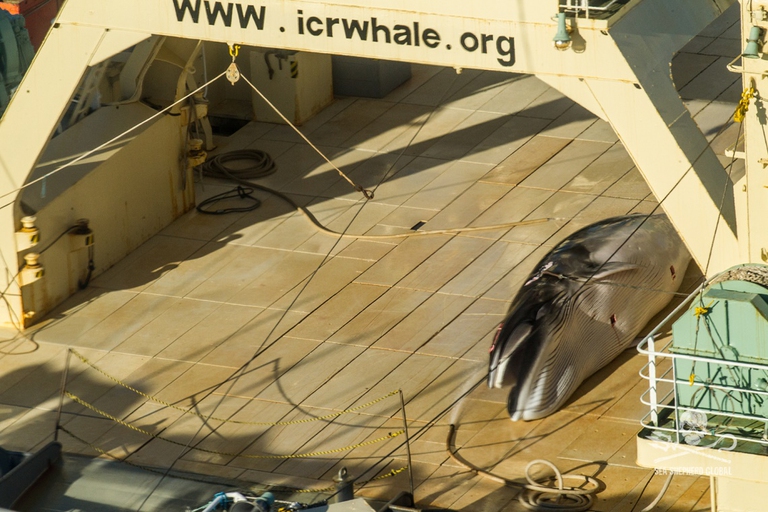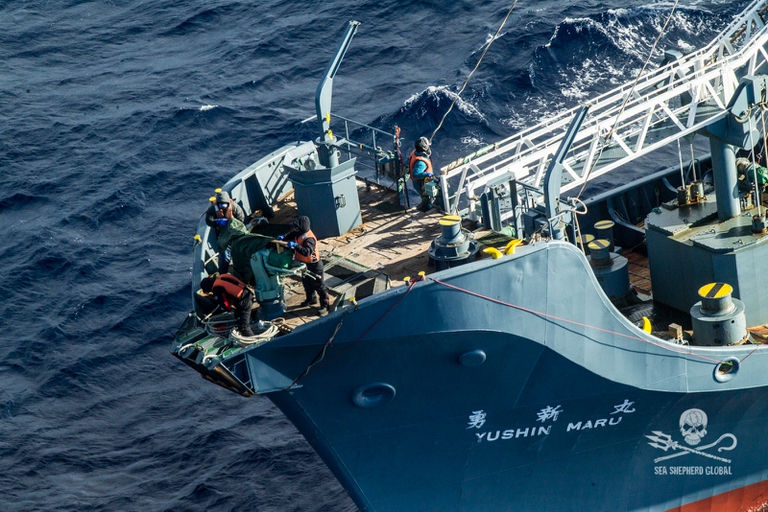
A group of experts in Tokyo suggested pouring radioactive water from Fukushima into the open sea. A marine biochemist explains the consequences of this absurd decision.
L’organizzazione conservazionista ha intercettato la flotta baleniera giapponese nel santuario delle balene nell’Oceano Antartico, area in cui è vietata la caccia ai cetacei.
Despite international law and the disapproval from all over the world, Japan continues killing whales, perpetrating an anachronistic and cruel practice.
Japanese whalers, which set sail from Shimonoseki harbour on 18 November with the aim of hunting 333 mink whales (Balaenoptera acutorostrata), headed to the Southern Ocean, home to the Australian whale sanctuary. The area expands for 50 million square kilometres in Antarctica and plays a crucial role for whales. In fact, most of whales feed in these waters, which have been designated as sanctuary in 1994 by the International Whaling Commission (IWC).
Japan claims the sanctuary is illegal and doesn’t recognise Australia’s sovereignty on such area. Indeed, the country regularly kills whale inside the sanctuary despite the Australian Federal Court already fined a Japanese whaling company for hunting inside the protected area.
After five weeks of patrolling the Antarctic Ocean, Sea Shepherd, the conservation organisation that fights against the slaughter of wild species populating the ocean, has spotted a Japanese whaler inside the Australian sanctuary with a dead mink whale on the ship deck. This is the first documented killing since 2014, when the International Court of Justice rejected the scientific research plan submitted by Japan, making whaling illegal.
The Nisshin Maru whaler has been photographed from a helicopter of Sea Shepherd’s MY Steve Irwin on 15 December. The Japanese crew tried to hide evidence, covering the whale with a tarpaulin and trying to hide the harpoons. “The whale killers from the Nisshin Maru were caught red-handed slaughtering whales in the Australian whale sanctuary,” said Adam Meyerson, the captain of the Sea Shepherd patrol ship Ocean Warrior. “The Steve Irwin has shut down their illegal operations and caught them trying to hide the evidence.”
Waiting for Australia to comment on the facts and to take action against the violation of its territorial waters by Japanese whalers, Sea Shepherd Australia director Jeff Hansen denounces a lack of firmness of Australia’s government. “A lack of action by the Turnbull government in response to the killing of whales in Australian waters on the tail of a state visit from Abe showed the government has no spine when it comes to protecting the wishes of Australians to defend the Southern Ocean whale sanctuary”.
Siamo anche su WhatsApp. Segui il canale ufficiale LifeGate per restare aggiornata, aggiornato sulle ultime notizie e sulle nostre attività.
![]()
Quest'opera è distribuita con Licenza Creative Commons Attribuzione - Non commerciale - Non opere derivate 4.0 Internazionale.
A group of experts in Tokyo suggested pouring radioactive water from Fukushima into the open sea. A marine biochemist explains the consequences of this absurd decision.
The decline in grey and humpback whales in the Pacific and Atlantic Oceans has been traced to food shortages caused by rising ocean temperatures.
The United Nations has launched a major international alliance for ocean science, undertaking a mission close to all our hearts.
The cargo ship that ran aground off the coast of Mauritius on 25 July, causing incalculable damage, has split in two and its captain has been arrested.
The largest coral reef in the world is severely threatened by climate change, but researchers are developing strategies that could contribute to saving the Great Barrier Reef.
Seychelles have extended its marine protected area, which now covers over 400,000 square kilometres, an area larger than Germany.
Norwegian oil giant Equinor had pulled out of drilling for oil in the Great Australian Bight, one of the country’s most uncontaminated areas. A victory for activists and surfers who are now campaigning for the area to be protected forever.
30 per cent of the planet needs to be protected to stop precipitous species decline. The UN has set out its aims for the the COP15 on biodiversity scheduled for Kunming, China in October.
Ocean warming has risen to record highs over the last five years: just in 2019 the heat released into the world’s oceans was equivalent to that of 5-6 atomic bombs per second. The culprit, no doubt, is climate change.










